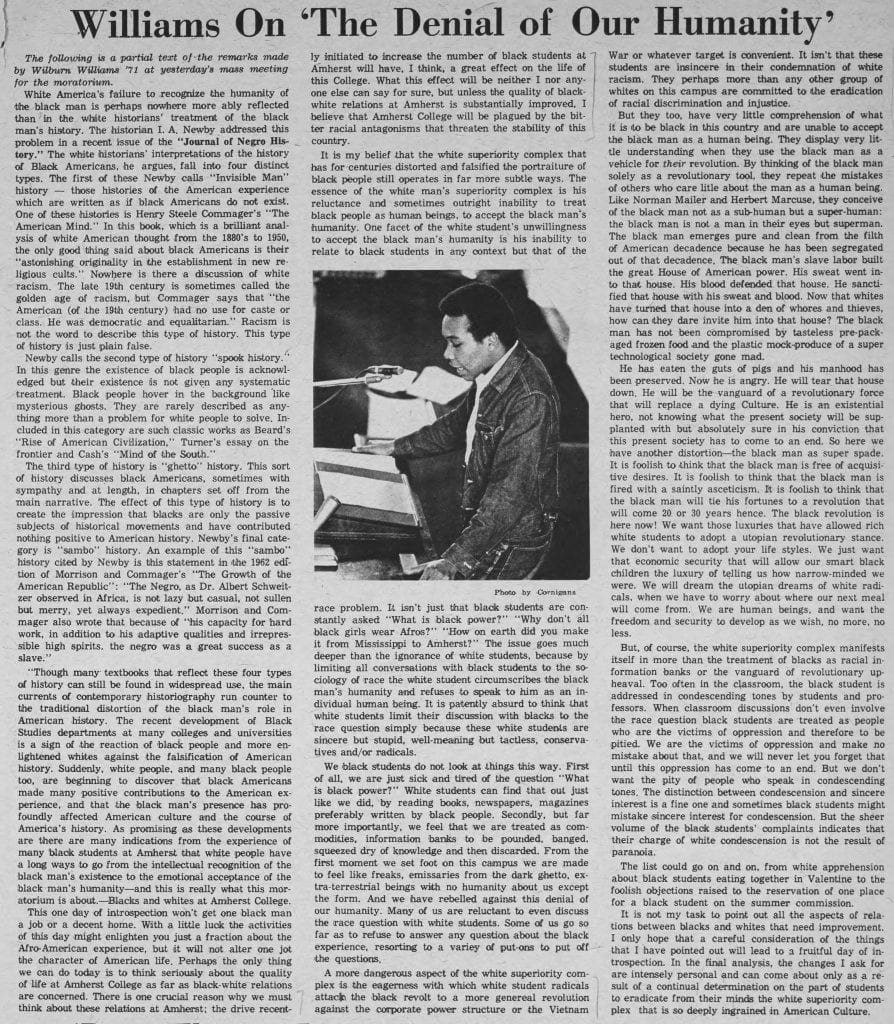The Amherst Student issue from May 8th, 1969
“Wednesday Inquiry Into Racism Features Ellison, Seminars”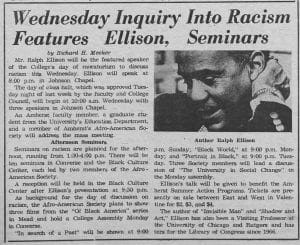
Written by Richard H. Meeker.
“Mr. Ralph Ellison will be the featured speaker of the College’s day of moratorium to discuss racism this Wednesday… The day of class halt, which was approved Tuesday night of last week by the faculty and College council, will begin at 10:00 a.m. Wednesday with three speakers in Johnson Chapel.”
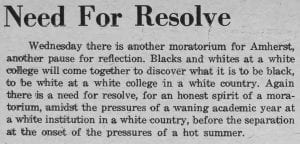 “Need For Resolve”
“Need For Resolve”
“Wednesday there is another moratorium for Amherst, another pause for reflection. Blacks and whites at a white college will come together to discover what it is to be black, to be white at a white college in a white country.”
The Amherst Student issue from May 15th, 1969
“400 Attend Mass College Meeting To Discuss 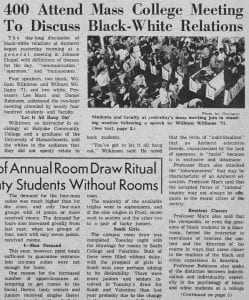 Black-White Relations”
Black-White Relations”
“The day-long discussion of black-white relations at Amherst began yesterday morning at a general meeting in Johnson Chapel with definitions of themes for the day, ‘communications,’ ‘openness,’ and ‘humaneness.'” Read second part here.
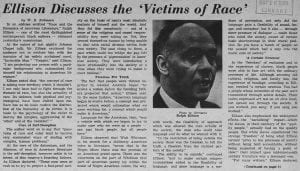 “Ellison Discusses the ‘Victims of Race'”
“Ellison Discusses the ‘Victims of Race'”
Written by W. E. Robinson.
“In an address entitled ‘Race and the Dynamics of American Literature,’ Ralph Ellison – one of the most distinguished contemporary black authors – climaxed yesterday’s moratorium… Ellison noted that ‘the concept of race is taking over territory which it shouldn’t. I not only have had to fight through the rhetoric of race, but also the actuality of race. Its violence, both physical and psychological, have been visited upon me. Race has as its basic motive the destruction of the humanity of its victim. It is basic to the psychology of the racist to destroy the complex, aggravating ‘other’ and of the ‘outsider.'” Read second part here.
“Williams On ‘The Denial of Our Humanity'”
Written by Wilburn Williams ’71.
“It is my belief that the white superiority complex that has for centuries distorted and falsified the portraiture of black people still operates in far more subtle ways. The essence of the white man’s superiority complex is his reluctance and sometimes outright ability to treat black people as human beings, to accept the black man’s humanity. One facet of the white student’s unwillingness to accept the black man’s humanity is his inability to relate to black students in any context but that of the race problem… [W]e feel that we are treated as commodities, information banks to be pounded, banged, squeezed dry of knowledge and then discarded. From the first moment we set foot on this campus we are made to feel like freaks, emissaries from the dark ghetto, extra-terrestrial beings with no humanity about us except the form. And we have rebelled against this denial of our humanity.”
“Moratorium II”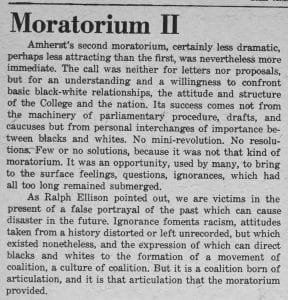
“Amherst’s second moratorium, certainly less dramatic, perhaps less attracting than the first, was nevertheless more immediate. The call was neither for letters nor proposals, but for an understanding and a willingness to confront basic black-white relationships, the attitude and structure of the College and the nation… It was an opportunity, used by many, to bring to the surface feelings, questions, ignorances, which had all too long remained submerged.”
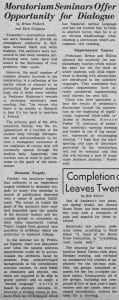 “Moratorium Seminars Offer Opportunity for Dialogue”
“Moratorium Seminars Offer Opportunity for Dialogue”
Written by Brian Pollard and Rick Goggans.
“However, the small number of students directly involved in the moratorium is a reflection of the apathy which is claimed to be permeating the general student body and it lends some validity to Professor Robinson’s remark at yesterday morning’s open meeting, that ‘the reason why there is no trouble at Amherst is that it’s too hard to overturn a Ferrari.'”
The Amherst Student issue from June 5th, 1969
“Black Moratorium Caps Year of Decision for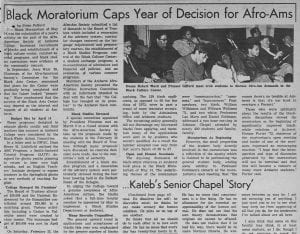 Afro-Ams”
Afro-Ams”
Written by Brian Pollard
“The Black Moratorium of May 14 was the culmination of a year’s activity on the part of the Afro-American Society at Amherst College. Increased recruitment of blacks and establishment of a black culture center, summer tutorial programs, and black studies curriculum were evidence of the community concern.”
Main Page | Site Map | The Process
Photo credit Amherst College Olio
